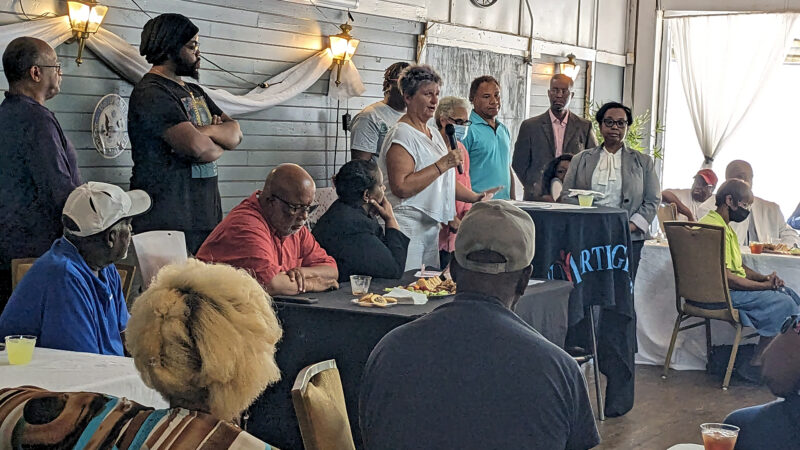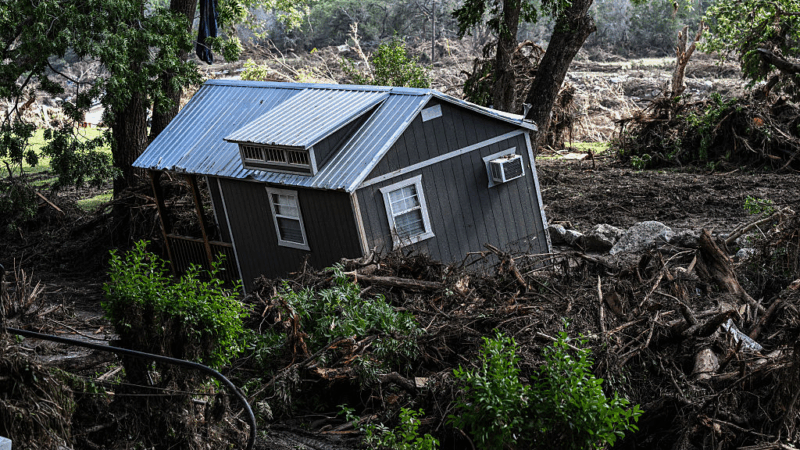Researchers look into community health impact of wood pellet production in rural Mississippi
Residents gather for a community Chat and Chew event with Mississippi’s U.S. Rep Bennie Thompson on Wednesday, August 23, 2023, in downtown Gloster, MS. Residents there gather to talk about their experiences living near the Drax wood pellet plant.
About two hours southwest of Jackson sits Gloster, Mississippi, a rural town that’s home to the Drax wood pellet plant — one of several in the Gulf South.
Often used overseas, burning wood pellets for fuel can help power energy and heating systems, and proponents of the practice say it’s cheaper than other fuel sources and low in moisture and ash content, meaning the wood pellets should burn cleanly.
But researchers from Brown University in Rhode Island and Tougaloo College in Jackson, Mississippi, are examining if these wood pellet plants are harming the health of residents in the surrounding communities.
Students from both schools spent the Spring 2024 semester measuring the lung health of 112 Gloster residents. The study was done in partnership with the Greater Greener Gloster Project, a community-based environmental justice group partially led by Krystal Martin.
The study also compared the plant’s effects on the Gloster residents to the health of residents living in Mendenhall, Mississippi, a town with similar median incomes for residents and a similar poverty rate to Gloster’s, but does not have wood pellet manufacturing nearby.
Researchers set up air pollution monitors to measure levels of volatile organic compounds, which the Environmental Protection Agency says can cause damage to the liver, kidney and central nervous system, and certain hazardous air pollutants that can increase the chance of cancer or serious health effects such as respiratory and neurological problems. Researchers also monitored the area for noise pollution.
They found that Mendenhall had less air pollution and less noise pollution than Gloster did. Erica Walker, an assistant professor of epidemiology at the Brown University School of Public Health, said the early findings are limited, and the universities plan to study Gloster long term. They still have to analyze lung capacity and blood data, for example.
“The strength of this is that we are beginning to actually put real data to the question of whether or not wood pellet manufacturing is harmful to the communities who live nearby,” Walker said. “Until this work, very little has been done in this space.”
Results were presented during a community meeting in early May. Betty Ravencraft, who lives less than a mile from the Gloster mill, said she’s seen her husband and neighbors get sick. A new study, Ravencraft believes, could help provide residents with the data they need to ask for accountability from Drax, the international company headquartered in the U.K. that owns the plant, and environmental regulators.
“Our lives are at stake,” Ravencraft said. “We’re going to keep screaming at the top of our lungs. So if you just stay with us and keep helping us, we would really appreciate it.”
Half of the people surveyed were between the ages of 40 to 60, with the rest spread out from ages 12 to 80. Participants were 96% African American and 4% Caucasian. The majority (86) were female.
Brown and Tougaloo students will return this summer to help distribute DIY air purifiers for residents to help address indoor air quality. Future research plans include having more monitoring sites, broadening which air pollutants are studied, increasing sample sizes and representations of groups with higher risks of lung impairment, and measuring more households for indoor air quality.
They are also implementing a public health survey across Mississippi to collect information on children.
“The idea is to understand how this wood pellet manufacturing is influencing the health of children that live nearby,” Walker said.
This story was produced by the Gulf States Newsroom, a collaboration between Mississippi Public Broadcasting, WBHM in Alabama, WWNO and WRKF in Louisiana and NPR.
India has long promised ‘vibrant’ border villages, as China speedily builds up
India's government launched a Vibrant Villages Programme almost four years ago. But as China steadily builds up its side, Indian residents wonder what's taking so long.
Longtime civil rights leader Rev. Jesse Jackson dies at 84
The Rev. Jesse Jackson was a lifelong civil rights advocate until his death Tuesday at the age of 84.
Minnesota Republicans defend their focus on fraud despite the ICE surge that followed
Minnesota Republicans say they were right to invite social media influencers into the state to highlight social service fraud, though Democrats blame Republicans for paving the way for the ICE surge.
TV antennas and Super Bowl rehearsals: How prediction market traders seek an edge
As prediction markets boom, competition is heating up. So traders go the extra mile for a fraction-of-a-second advantage or to sleuth out information nobody else has. It can lead to a huge payday.
A once-underused immigration enforcement program has exploded under Trump
Partnerships between ICE and local law enforcement agencies has expanded widely, under the second Trump administration, data analyzed by NPR shows.
3 big changes are proposed for FEMA. This is what experts really think of them
The Trump administration is proposing massive changes to the Federal Emergency Management Agency. We asked disaster experts to weigh in.







